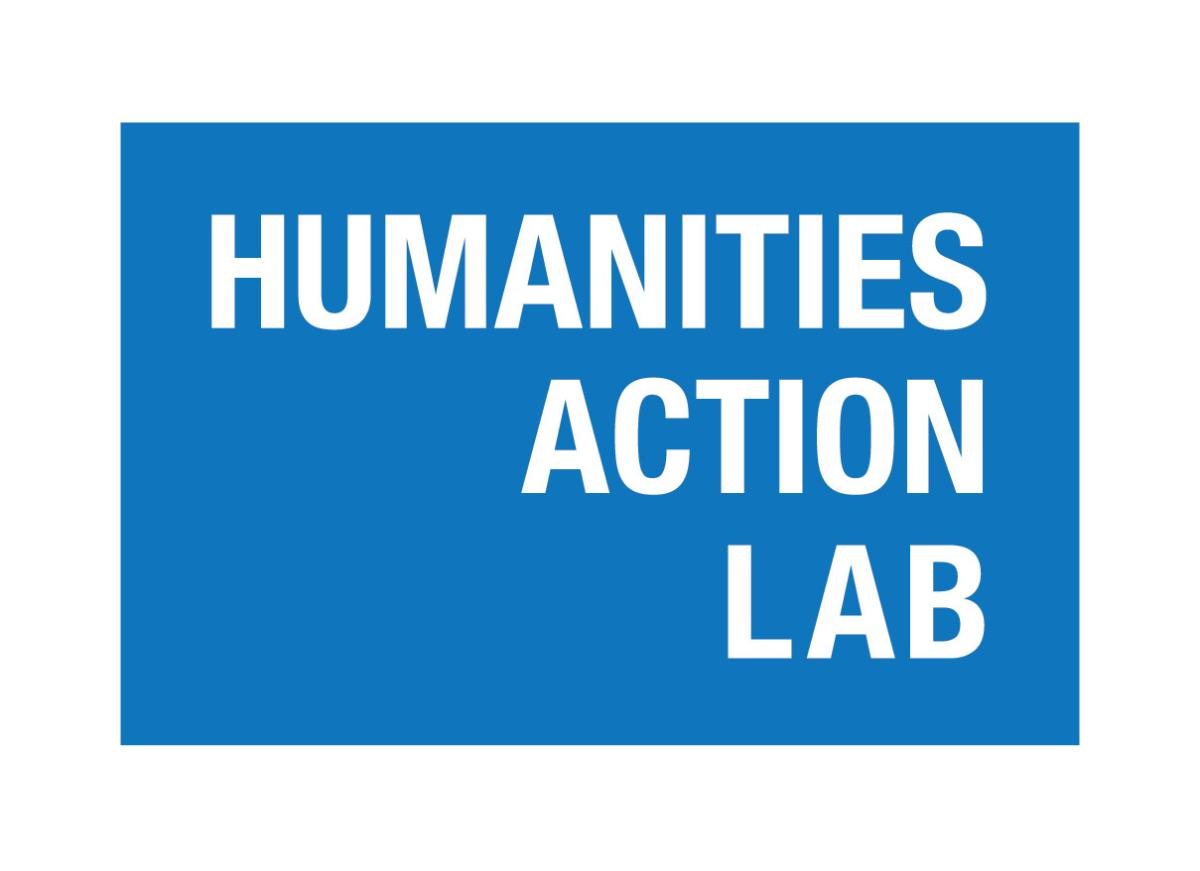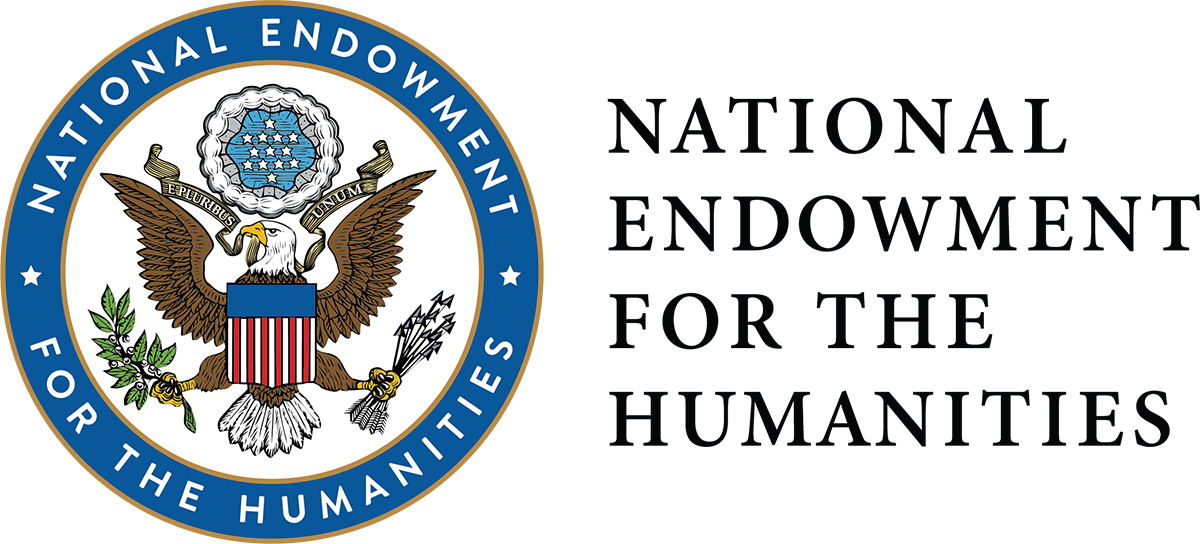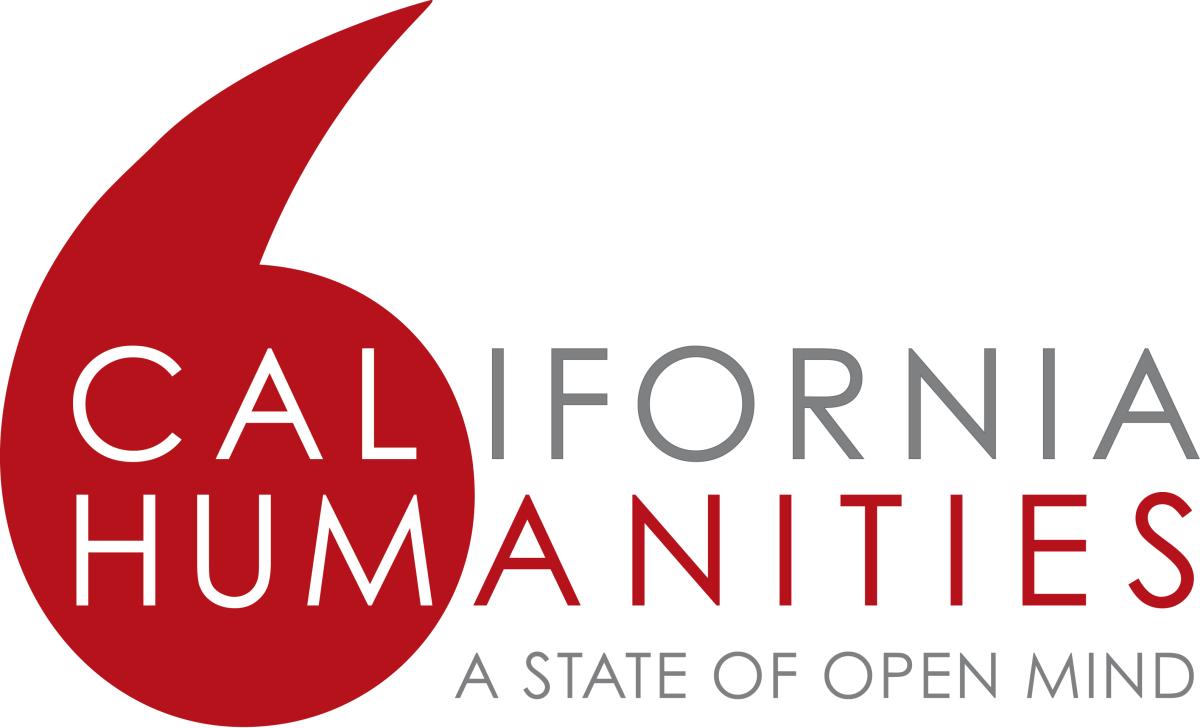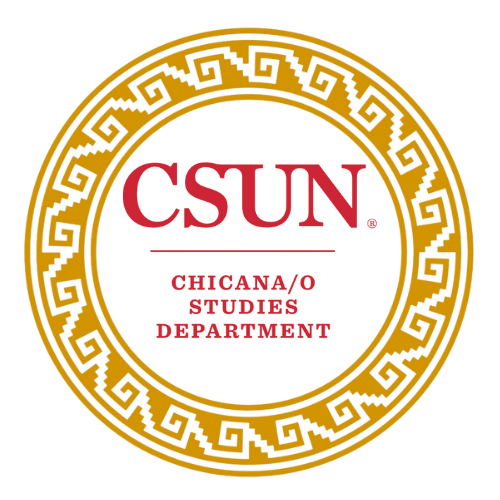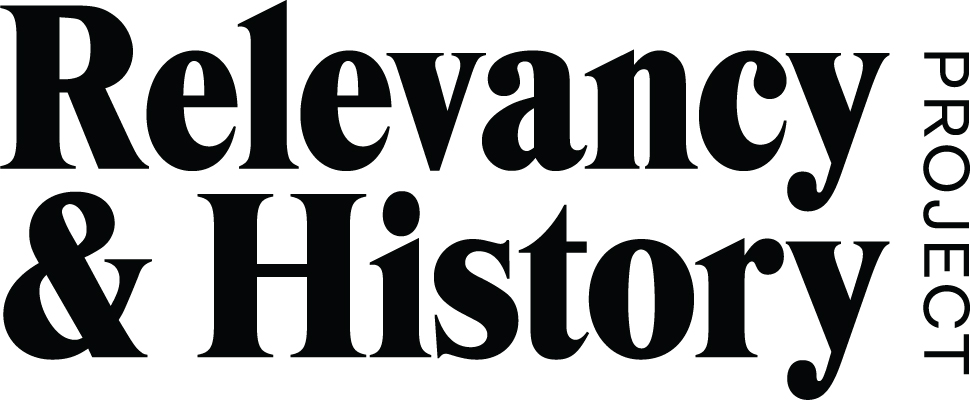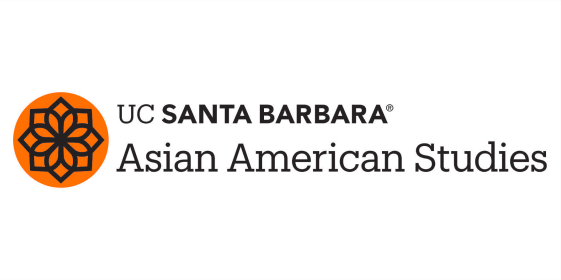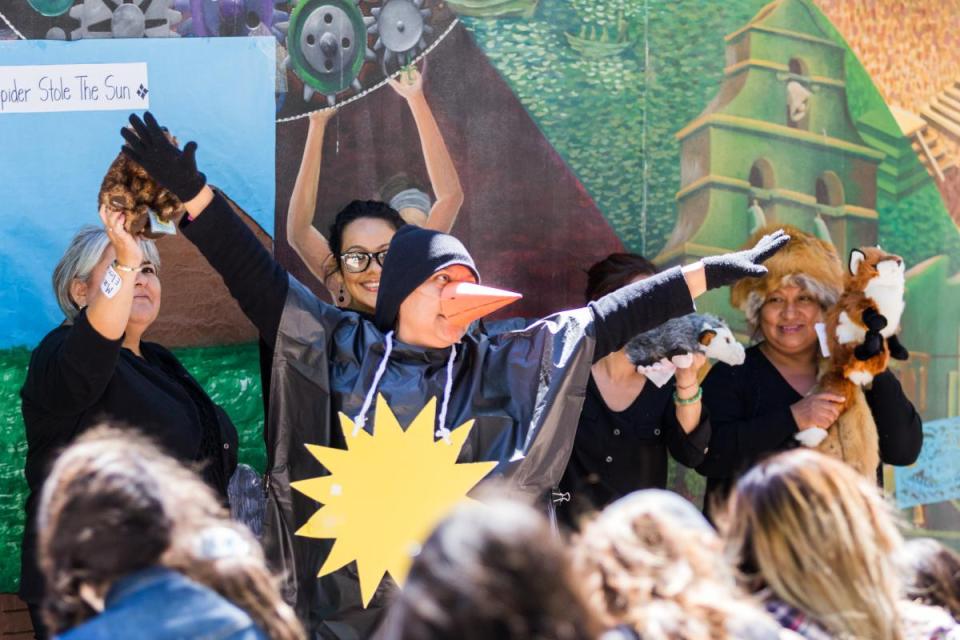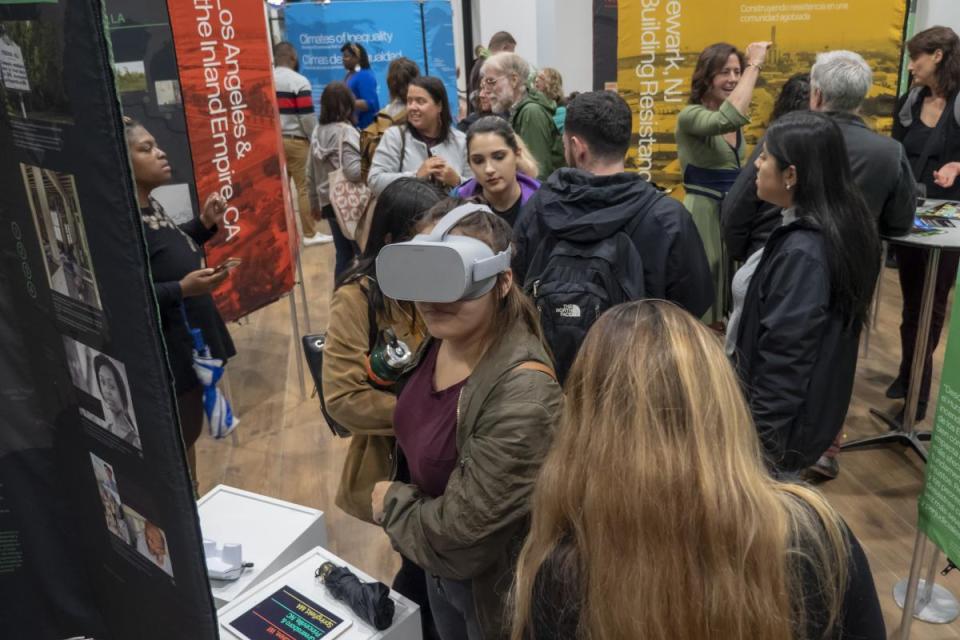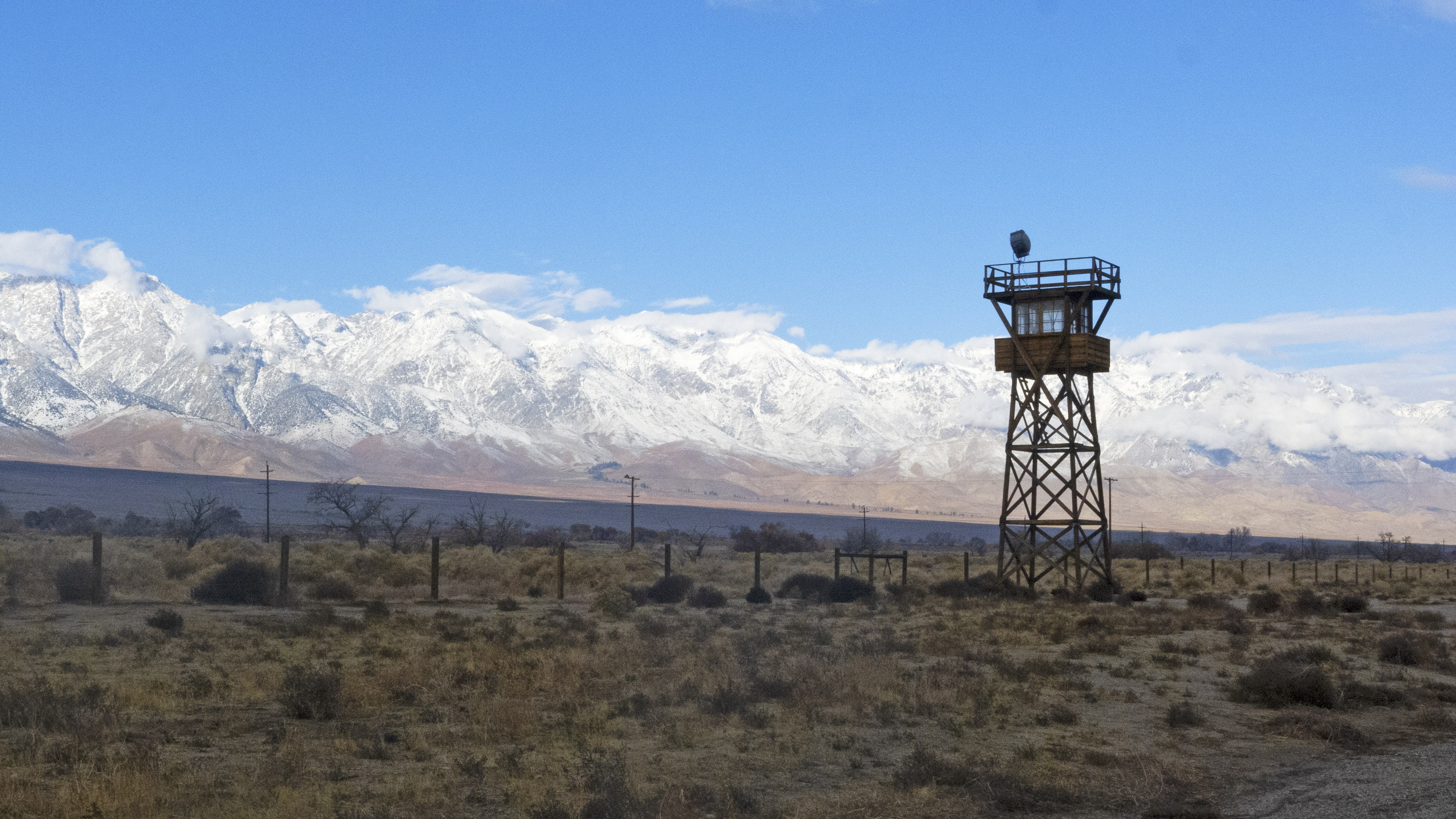

Join us for a lively conversation with environmental justice leaders from Southern California as they discuss how their communities mobilize storytelling for change and to save lives. The daylong symposium includes the following speakers, as well as a screening and discussion of the documentary, Manzanar, Diverted: When Water Becomes Dust (2021). Spanish/English interpreters will be available throughout the day.
Still from Manzanar, Diverted: When Water Becomes Dust, 2021. Courtesy of Ann Kaneko.
SCHEDULE
9 a.m.–9:30 a.m.: Join us for coffee and pastries
9:30 a.m.–9:45 a.m.: Symposium Welcome with Stevie Ruiz (CSUN), Lisa Sun-Hee Park (UCSB), and Cathy Gudis (UCR)
9:45 a.m.–11 a.m.: Organizing for Environmental Justice in Southern California. Featuring Rosa RiVera-Furumoto and Parent Pioneers (San Fernando Valley), Alicia Aguayo (People’s Collective for Environmental Justice), Amy Honjiyo (Sustainable Little Tokyo), and Nalleli Cobo (People Not Pozos); moderated by Stevie Ruiz
11 a.m.–12 p.m.: Self-guided tour of Climates of Inequality pop-up exhibition and the Japanese American National Museum. (Climates of Inequality Docents: Yvonne Marquez, Frances Tang, Azeneth Martinez)
12 p.m.–1 p.m.: Lunch Break. Please feel free to explore the options in Little Tokyo.
1 p.m.–2:15 p.m.: Shifting the Narrative: Environmental Justice and the Place of Public Humanities. Featuring Liz Ševčenko (Humanities Action Lab), Yenyen Chan (National Park Service), Kristen Hayashi (Japanese American National Museum), and Nicole Lim (California Indian Museum and Cultural Center); moderated by Cathy Gudis
2:15 p.m.–2:30 p.m.: Break
2:30 p.m.–4 p.m.: Screening of Manzanar, Diverted: When Water Becomes Dust (2021, 84 min., Spanish subtitles)
4 p.m.–4:30 p.m.: Q&A with Ann Kaneko (Film Director) and Noah Williams (Bishop Paiute Tribe); moderated by Lisa Sun-Hee Park
4:30 p.m.–5:30 p.m.: Closing Reception
Speakers
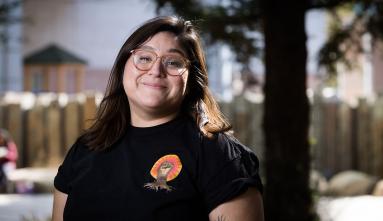
Alicia Aguayo
Alicia Aguayo is a lifelong resident of San Bernardino in the Inland Empire, California. She was born and raised on the West Side near a major intermodal facility of railyards and witnessed her community enduring the harmful health impacts of the growing logistics industry like asthma and cancer. She's been actively involved in her community for over a decade fighting for education, health, immigrant and environmental rights. She is the communications manager with the People's Collective for Environmental Justice working to uplift the stories of residents and pushing back against the expanding goods movement industry that has targeted and made her community a diesel death zone. Alicia is committed to fighting for a just transition away from fossil fuels and an industry that has largely contributed to the ongoing climate crisis and environmental injustices in her community. She will be welcoming her first son this November 2023 and hopes that he and future generations will get to experience new systems that are not extractive and capitalistic.
Alicia Aguayo ha vivido toda su vida en San Bernardino, en Inland Empire, California. Nació y se crio en el West Side, cerca de una importante instalación intermodal de vías férreas, y fue testigo de cómo su comunidad soportaba los efectos nocivos para la salud de la creciente industria logística, como el asma y el cáncer. Lleva más de una década participando activamente en su comunidad luchando por la educación, la salud, los derechos de los inmigrantes y el medio ambiente. Actualmente trabaja como directora de comunicaciones en el Colectivo Popular por la Justicia Ambiental (People's Collective for Environmental Justice) para dar a conocer las historias de los residentes y luchar contra la creciente industria del transporte de mercancías, que ha convertido a su comunidad en una zona de muerte del diésel. Alicia se ha comprometido a seguir luchando por una transición justa que se aleje de los combustibles fósiles y de una industria que ha contribuido en gran medida a la actual crisis climática y a las injusticias medioambientales en su comunidad. Dará la bienvenida a su primer hijo en noviembre de 2023 y espera que él y las generaciones futuras puedan experimentar nuevos sistemas que no sean extractivos y capitalistas.
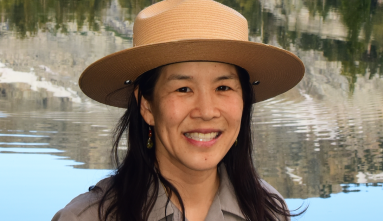
Yenyen Chan
Yenyen Chan has been working for the National Park Service in Yosemite since 2003. As a park ranger, she presents numerous natural and cultural history programs for the public. She also writes interpretive materials, leads staff training workshops, oversees park visitor center operations, and organizes and facilitates special park events. Her research on the significant contributions made by early Chinese immigrants in Yosemite inspired an annual six-day event called the Yosemite Sing Peak Pilgrimage that began in 2013. Her primary research led to a new permanent exhibition at Yosemite’s historic Chinese Laundry building. She is currently on assignment with the NPS’s Washington DC office working on commemorations and anniversaries projects. Prior to working for the NPS, she worked as an environmental consultant in Hong Kong and at several nonprofits in the US and Bhutan. She received degrees in History and Environmental Studies from Yale and a master’s degree in Environmental Policy and Natural Resources Management from the Yale School of the Environment.
Yenyen Chan trabaja para el Servicio de Parques Nacionales en Yosemite (National Park Service in Yosemite) desde 2003. En su función como guarda forestal, presenta numerosos programas de historia natural y cultural para el público. También redacta material interpretativo, dirige talleres de formación del personal, supervisa las operaciones del centro de visitantes del parque y organiza y facilita eventos especiales del parque. Su investigación sobre las importantes contribuciones realizadas por los primeros inmigrantes chinos en Yosemite inspiró un evento anual de seis días llamado Yosemite Sing Peak Pilgrimage que comenzó en 2013. Su investigación principal dio lugar a una nueva exposición permanente en el histórico edificio de la Lavandería China de Yosemite. Actualmente trabaja en la oficina del Servicio de Parques Nacionales en Washington D.C. en proyectos de conmemoración y aniversarios. Antes de trabajar para el Servicio de Parques Nacionales, trabajó como consultora medioambiental en Hong Kong y en varias organizaciones sin ánimo de lucro en Estados Unidos y Bután. Es licenciada en Historia y Estudios Medioambientales por la Universidad de Yale y posee una maestría en Política Medioambiental y Gestión de Recursos Naturales de la Escuela del Medio Ambiente de Yale.
Nalleli Cobo
Nalleli Cobo spearheaded a grassroots campaign that permanently closed a hazardous oil well in her South Los Angeles community. Beginning her activism journey at age nine, Nalleli, now twenty-two, bravely confronted pollution-related health issues like headaches and nosebleeds from the local well. A gifted speaker from an early age, her advocacy prowess propelled her to the forefront of the movement against oil extraction in Los Angeles. Nalleli co-founded People Not Pozos, advocating for a safe neighborhood, and the South Central Youth Leadership Coalition, targeting environmental justice. Her relentless efforts culminated in the shutdown of the AllenCo drilling site, resulting in multiple criminal charges against its executives. Nalleli overcame cancer at nineteen and, after tireless work, influenced the unanimous vote by the Los Angeles City Council to phase out oil drilling in twenty years. Her leadership inspired SB1137, banning new oil wells near California communities. Recognized with the 2022 Goldman Environmental Prize, 2022 Time 100 Next, and Apolitical 100 Most Influential People in Climate Policy.
Nalleli Cobo encabezó una campaña popular que consiguió el cierre definitivo de un peligroso pozo de petróleo en su comunidad del sur de Los Ángeles. Nalleli, quien ahora tiene 22 años, comenzó su camino activista a los 9 años, enfrentándose con valentía a problemas de salud relacionados con la contaminación, como dolores de cabeza y hemorragias nasales provocadas por el pozo local. Desde muy pequeña, su gran talento como oradora, la llevó a la vanguardia del movimiento contra la extracción de petróleo en Los Ángeles. Nalleli fue cofundadora de Gente, no Pozos (People Not Pozos), que aboga por un vecindario seguro, y de la Coalición de Liderazgo Juvenil de South Central (South Central Youth Leadership Coalition), que lucha por la justicia medioambiental. Sus incansables esfuerzos culminaron con el cierre de la perforadora petrolera de Allen Co, que dio lugar a múltiples cargos penales contra sus ejecutivos. Nalleli superó cáncer a los 19 años y, tras un trabajo incansable, influyó en el voto unánime del Consejo Municipal de Los Ángeles para eliminar progresivamente en 20 años las perforaciones petroleras. Su liderazgo inspiró la ley SB1137, que prohíbe la perforación de nuevos pozos petroleros cerca de las comunidades californianas. Reconocida con el Premio Goldman del Medio Ambiente para 2022, de la Revista Time 100 Next para 2022 y de Apolítica: las 100 personas más influyentes en la política climática.
Photo: Tamara Leigh
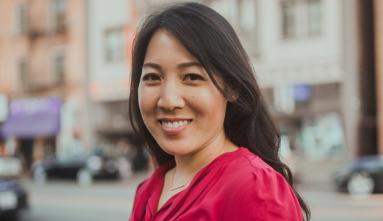
Kristen Hayashi
Kristen Hayashi, PhD, is director of Collections Management and Access and a curator at the Japanese American National Museum, where she oversees the permanent collection and curates content through exhibitions and public programs. Previously, she worked at the Natural History Museum of Los Angeles County in various capacities within research and collections, including as part of the curatorial team for the Becoming Los Angeles exhibition. In addition to her work in museums, she also engaged in heritage conservation work and has authored several historic cultural monument nominations for buildings and sites in Los Angeles. She currently serves on the board of directors for the Little Tokyo Historical Society and Asian Pacific Islanders in Historic Preservation (APIAHiP). Hayashi earned a PhD in history from the University of California, Riverside. Her dissertation research examined the return and resettlement of Japanese Americans to Los Angeles in the early post-World War II period.
La doctora Kristen Hayashi es directora de gestión y acceso a las colecciones y conservadora del Museo Nacional Japonés Americano (Japanese American National Museum), donde supervisa la colección permanente y el contenido de las exposiciones y los programas públicos. Anteriormente, trabajó en el Museo de Historia Natural del Condado de Los Ángeles en diversos puestos dentro de la investigación y las colecciones, incluso como parte del equipo de comisarios de la exposición Becoming Los Angeles. Además de su trabajo en museos, también se ha dedicado a la conservación del patrimonio y ha sido autora de varias candidaturas a monumentos culturales históricos para edificios y lugares de Los Ángeles. Actualmente es miembro de la junta directiva de la Sociedad Histórica de Little Tokyo y de asiáticos e isleños del Pacífico en la Preservación Histórica [Asian Pacific Islanders in Historic Preservation (APIAHiP)]. Hayashi obtuvo un doctorado en Historia de la Universidad de California en Riverside. Su tesis doctoral examinó el retorno y reasentamiento de los japoneses americanos en Los Ángeles a principios de la era posterior a la Segunda Guerra Mundial.
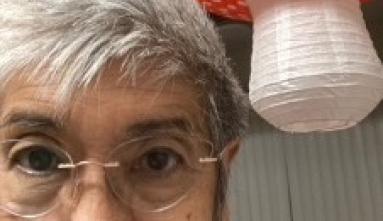
Amy Honjiyo
Amy Honjiyo is the Cycle of Food Coordinator for Sustainable Little Tokyo. She has a lifetime of experiences interacting and communicating with people and is always open to new ideas and learning from her mistakes. Quick solutions are just an illusion while the journey reveals the true richness of the day. In her current work, she encourages Little Tokyo businesses and residents to collect and recycle their food waste. At the same time, she demonstrates opportunities for reducing waste and food rescue. Weekly gatherings promote community by appreciating each individual’s back story and contribute to understanding food growing, eating, and recycling traditions.
Amy Honjiyo es la Coordinadora del Ciclo de Alimentos de Little Tokyo Sostenible (Sustainable Little Tokyo). Ha tenido toda una vida de experiencias interactuando y comunicándose con la gente, y siempre está abierta a nuevas ideas y, con suerte, a aprender de sus errores. Las soluciones rápidas son sólo una ilusión, mientras que el recorrido revela la verdadera riqueza del día. En su trabajo actual, anima a los comercios y a los residentes de Little Tokyo a recoger y reciclar sus residuos de comida. Y, al mismo tiempo, muestra oportunidades para reducir los residuos y rescatar alimentos. Las reuniones semanales promueven la comunidad apreciando la historia de cada individuo y contribuyen a comprender las tradiciones de cultivo, consumo y reciclaje de alimentos.
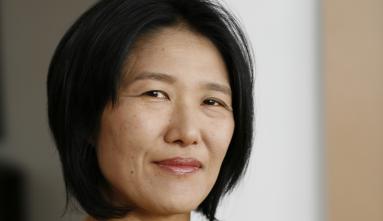
Ann Kaneko
Ann Kaneko is known for her personal films that weave her intimate aesthetic with the complex intricacies of political reality. An Emmy Award winner, her poetic feature, Manzanar, Diverted: When Water Becomes Dust, was broadcast on PBS POV’s 2022 line up. She is currently developing 45/45, a personal film about multigenerational families and cycles of life, and Land, Labor and Logistics, for which she is an 18th Street Arts Center California Creative Corps fellow. Credits include A Flicker In Eternity; Against the Grain: An Artist’s Survival Guide to Peru; Overstay; and 100% Human Hair. Fluent in Japanese and Spanish, Kaneko has been a Fulbright, Japan Foundation Artist, Film Independent Doc Lab, and Jackson Wild Multicultural Fellow. Funders include JustFilms/Ford, Doc Society, the Redford Center, Center for Asian American Media (CAAM), Vision Maker Media, Firelight Media, Chicken & Egg Pictures, and Hoso Bunka Foundation. She teaches at the Claremont colleges and was the artist mentor for Visual Communication’s Armed with a Camera Fellowship.
Ann Kaneko es conocida por sus películas personales que entretejen su estética intimista con los complejos entresijos de la realidad política. Ganadora de un premio Emmy, su poético largometraje Manzanar, Diverted: When Water Becomes Dust, transmitida en la línea 2022 por la cadena PBS POV. Actualmente está desarrollando 45/45, una película personal sobre familias multigeneracionales y ciclos vitales, y Land, Labor and Logistics (Tierra, Mano de Obra y Logistica), para la que es becaria del 18th Street Arts Center California Creative Corps (Centro artístico calle 18, Cuerpo Creativo de California). Entre sus créditos figuran A Flicker In Eternity; Against the Grain: An Artist’s Survival Guide to Peru; Overstay; and 100% Human Hair. Kaneko habla japonés y español con fluidez y ha sido becaria Fulbright, Japan Foundation Artist, Film Independent Doc Lab y Jackson Wild Multicultural Fellow. Ha recibido financiación de JustFilms/Ford, Doc Society, Redford Center, CAAM, Vision Maker Media, Firelight Media, Chicken and Egg y Hoso Bunka Foundation. Imparte clases en los colegios Claremont y fue la artista mentora de la beca Armados con una cámara de comunicación visual (Armed with a Camera of Visual Communication.)
Nicole Lim
Nicole Lim is Executive Director of the California Indian Museum and Cultural Center. She earned advanced degrees from the University of California, Berkeley and University of San Francisco School of Law. She is Pomo/Miwok and has worked for the National Indian Justice Center and the California Indian Museum and Cultural Center (CIMCC) since 1996. As Executive Director of the CIMCC, she develops exhibitions, educational programs, and curricular resources that represent Native American perspectives. She founded the Tribal Youth Ambassadors program in 2010. The program received the National Arts and Humanities Youth Program Award from the President’s Committee on Arts and Humanities in 2016. She co-edited On Indian Ground: California, the first in a series of books that focus on best practices for K–12 educators of Native students. California Governor Edmund Brown appointed her to the Board of Directors, 4th District Agricultural Association, Sonoma-Marin Fair, where she served from 2013–2017. Nicole served as the vice president of the California Association of Museums (CAM) and formerly co-chaired CAM’s Government Relations committee. She also serves as the Secretary for the National Tribal GIS program and is a member of the Native American Advisory Committee to the University of California Office of the President. She also serves on T-Mobile’s External Diversity and Inclusion Sub Council for California and is the chairperson of the American Indian Education Oversight Committee to the California State Superintendent of Public Instruction.
Nicole Lim es directora ejecutiva del Museo y Centro Cultural Indio de California. Ha cursado estudios superiores en la Universidad de California en Berkeley y en la Facultad de Derecho de la Universidad de San Francisco. Es pomo-miwok y trabaja para el Centro Nacional de Justicia Indígena y el Museo y Centro Cultural Indígena de California (CIMCC) desde 1996. Como directora ejecutiva del CIMCC, trabaja para desarrollar exposiciones, programas educativos y recursos curriculares que representen las perspectivas de los nativos americanos. En 2010 fundó el programa Tribal Youth Ambassadors. El programa recibió el Premio Nacional de Artes y Humanidades para Jóvenes del Comité Presidencial de Artes y Humanidades en 2016. Es coeditora de On Indian Ground: California, el primero de una serie de libros que se centran en las mejores prácticas para educadores de grados K al 12 de estudiantes nativos. El gobernador de California, Edmund Brown, la nombró miembro de la Junta Directiva de la Asociación Agrícola del 4º Distrito, Feria de Sonoma-Marin, donde trabajó de 2013 a 2017. Nicole fue vicepresidenta de la Asociación de Museos de California (CAM) y anteriormente copresidió el comité de Relaciones Gubernamentales de CAM. También es secretaria del programa National Tribal GIS y miembro del Comité Asesor de Nativos Americanos de la Oficina del Presidente de la Universidad de California. También forma parte del Subconsejo de Diversidad e Inclusión Externas de T-Mobile para California y es presidenta del Comité de Supervisión de la Educación Indígena Americana del Superintendente de Instrucción Pública del Estado de California.
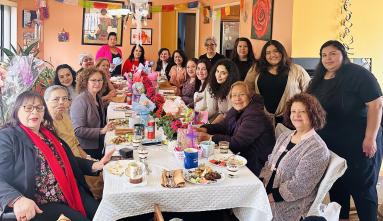
Parent Pioneers-Padres Pioneros
Parent Pioneers-Padres Pioneros is a grassroots group of Mexican American and Central American mothers and grandmothers with over twenty-seven years of activism addressing social justice issues such as anti-war, immigrant rights, and language rights. Since 2014 Padres Pioneros has turned their attention to addressing climate and environmental justice in their communities. Their work is deeply rooted in the indigenous knowledge from their families, hometowns, and pueblos in Mexico and Central America. Their activities include after-school culturally relevant environmental STEAM programming for elementary children and their families, restoring public lands, planting trees in local schools and communities, and providing climate leadership training to community members locally, in other states, and globally. Parent Pioneers also develops educational materials such as curriculum, books, and games. They work closely with California State University Northridge Chicana/o Studies Department students and faculty to implement many of these programs
Parent Pioneers-Padres Pioneros es un grupo de base de madres y abuelas mexicoamericanas y centroamericanas con más de veintisiete años de activismo abordando cuestiones de justicia social como la lucha contra la guerra, los derechos de los inmigrantes y los derechos del lenguaje. Desde 2014, Padres Pioneros ha centrado su atención en abordar la justicia climática y medioambiental en sus comunidades. Su trabajo está profundamente arraigado en el conocimiento indígena de sus familias, ciudades natales y pueblos de México y América Central. Entre sus actividades se incluyen programas STEAM (en ciencia, tecnología, ingeniería, artes y matemáticas) enfocados en el medio ambiente y culturalmente adecuados para niños de primaria y sus familias, la restauración de tierras públicas, la plantación de árboles en escuelas y comunidades locales, y la formación en liderazgo climático para miembros de la comunidad a nivel local, en otros estados y en todo el mundo. Padres Pioneros también desarrolla materiales educativos como planes de estudios, libros y juegos. Trabajan en estrecha colaboración con estudiantes y profesores del Departamento de Estudios Chicanos de la Universidad Estatal de California en Northridge para poner en práctica muchos de estos programas.
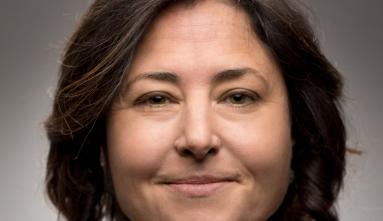
Liz Ševčenko
Liz Ševčenko is founding director of the Humanities Action Lab, a growing consortium of over thirty universities, issue organizations, and public spaces, led from Rutgers University-Newark, that collaborate to develop student- and community-curated public memory projects around contested social issues. HAL’s latest project is Climates of Inequality, a traveling exhibition, web platform, and public actions confronting histories of environmental racism and their legacies for the climate crisis, created by over 500 students and frontline community leaders across the hemisphere Previous projects include the Guantánamo Public Memory Project and States of Incarceration, which inspired the Rikers Public Memory Project, a collaboration with Freedom Agenda and Create Forward. Ševčenko was founding director of the International Coalition of Sites of Conscience and vice president for Programs at the Lower East Side Tenement Museum. She won the Rome Prize to write Public Memory for a Post-Truth Era: Fighting Denial through Memory Movements (Routledge, 2022).
Liz Ševčenko es directora fundadora del Laboratorio de Acción de Humanidades (Humanities Action Lab), un creciente consorcio de más de 30 universidades (consortium of over 30 universities), organizaciones temáticas y espacios públicos, dirigido desde la Universidad Rutgers-Newark, que colabora para desarrollar proyectos de memoria pública organizados y presentados por estudiantes y comunidades en torno a cuestiones sociales controvertidas. El último proyecto de HAL es Climas de desigualdad (Climates of Inequality), una exposición itinerante, plataforma web y acciones públicas que afrontan historias de racismo medioambiental y sus legados a la crisis climática, creadas por más de 500 estudiantes y líderes comunitarios de primera fila de todo el hemisferio. Entre los proyectos anteriores se incluyen el Proyecto de Memoria Pública de Guantánamo (Guantánamo Public Memory Project) y el de Estados de encarcelamiento (States of Incarceration), que inspiró el Proyecto de Memoria Pública de Rikers (Rikers Public Memory Project), una colaboración con Freedom Agenda y Create Forward. Ševčenko fue directora fundadora de la Coalición Internacional de Sitios de Conciencia (International Coalition of Sites of Conscience) y vicepresidenta de Programas del Museo del Lower East Side Tenement (Lower East Side Tenement Museum). Ganó el Premio Roma ( Rome Prize) por escribir Public Memory for a Post-Truth Era: Fighting Denial through Memory Movements (Routledge, 2022).
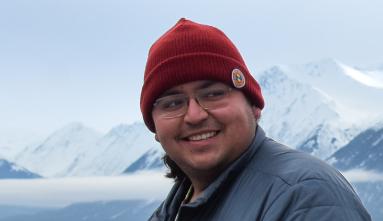
Noah Williams
Noah Williams is a proud member of the Bishop Paiute Tribe and grew up in the Owens Valley. In 2019, he earned a BA in Environmental Communication at California State University, Channel Islands. He now serves as the water program coordinator for the Big Pine Paiute Tribe of the Owens Valley where he carries out Clean Water Act §106 and §319 program activities, manages water program funding, collects surface and groundwater water quality data, upholds the tribe’s water quality standards, develops outreach and educational material, and oversees the tribe’s native plant nursery activities.
Noah Williams es un orgulloso miembro de la tribu Bishop Paiute y creció en el valle de Owens. En 2019, obtuvo una licenciatura en Comunicación Ambiental de la Universidad Estatal de California en Channel Islands. Ahora se desempeña como Coordinador del Programa de Agua para la Tribu Big Pine Paiute del Valle de Owens, donde lleva a cabo las actividades del programa §106 y §319 de la Ley de Agua Limpia y administra la financiación del programa de agua. Como Coordinador del Programa de Aguas, recopila datos sobre la calidad de las aguas superficiales y subterráneas, mantiene las normas de calidad del agua de la tribu, elabora material de divulgación y educativo y supervisa las actividades del vivero de plantas autóctonas de la tribu.
The Climates of Inequality symposium is cosponsored by the Japanese American National Museum (JANM); California State University, Northridge; University of California, Riverside; and University of California, Santa Barbara. Support for the project is provided by the Andrew W. Mellon Foundation; California Humanities; College of Humanities at California State University, Northridge; Geraldine R. Dodge Foundation, Learning in the Humanities and Social Sciences at Rutgers University-Newark School of Arts and Sciences; JANM; Relevancy & History Project; and the Pollitt Endowed Term Chair for Interdisciplinary Research and Learning at the University of California, Riverside.
